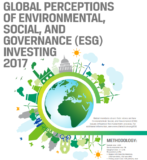
Bron
CFA Institute
Nearly three-quarters of investment professionals worldwide (73 percent) take environmental, social and corporate governance (ESG) factors into consideration in the investment process, according to a CFA Institute ESG Survey, Global Perceptions of Environmental, Social and Governance Investing, conducted in May 2017. Though the figure remains unchanged from a similar survey conducted in May 2015, there has been growth in the use of each component in the intervening period. Respondents to the survey who consider environmental factors increased from 50 to 54 percent, while consideration of social factors increased from 49 to 54 percent, and consideration of governance factors increased from 64 to 67 percent.
The highest concentration of CFA Institute members, who responded to the survey, considering ESG issues are in the Europe, Middle East, and Africa (EMEA) region (85 percent), followed closely by respondents in the Asia-Pacific (APAC) region (81 percent). Respondents in the Americas region were the least likely to use ESG information in their decision-making process, but a solid majority (68 percent) do consider ESG factors. Only 27 percent of CFA Institute members worldwide, who responded to the survey, do not consider ESG factors in the investment process. Of those who do not, 47 percent of respondents cite a lack of client or investor demand.
“Throughout the world, client demand is driving more ESG integration in the investment process. Whether or not ESG factors are a priority for them, we encourage all investors to have a clear perspective and understanding of the companies and assets in which they are investing,” said Matt Orsagh, Director, Capital Markets Policy at CFA Institute. “Every investment analyst should be able to identify and properly evaluate the full spectrum of investment risks, including ESG factors, to advise and protect investors to the best of their abilities.”
Key survey findings are summarized in Global Perceptions of Environmental, Social and Governance Investing, and are highlighted below:
- Regional differences: The Americas region trails EMEA and APAC in ESG integration in the investment process. Forty-three percent of respondents in EMEA receive specialized training, compared to 30 percent in APAC and 28 percent in the Americas.
- Client demand: Sixty-six percent of survey respondents said they would consider ESG factors in their analysis and decisions if investors demanded it. This theme was consistent across all regions with 67 percent in the Americas, 65 percent in APAC, and 61 percent in EMEA.
- Gender differences: Forty-six percent of men compared to 18 percent of women surveyed said ESG issues are immaterial or add no value. Sixty-two percent of women and 49 percent of men systematically consider ESG issues in their investment analysis.
- Generational differences: Younger generations are more likely to consider ESG factors with Millennials at 78 percent, Generation X at 74 percent, and Baby Boomers at 68 percent.
- Risk evaluation: Sixty-five percent of survey respondents said they consider ESG in the investment decision making process to help manage investment risks, 45 percent say that their clients/investors demand it, and 41 percent said ESG performance is a proxy for management quality.
- Top three issues in decision-making: Survey respondents ranked board accountability, human capital, and environmental degradation as the issues most important to investment analysis and decision-making.
Methodology
An online survey was conducted from 9 May to 23 May 2017. Some 1,588 members of CFA Institute who are portfolio managers and research analysts responded to the survey for a response rate of 3 percent. The margin of error for the survey was +/- 2.4 percent.
Regional Breakdown: 64 percent from Americas, 23 percent EMEA, 13 percent APAC.
Primary Asset Base: 42 percent primarily deal with institutional clients, 30 percent private clients, 18 percent both, and 10 percent not applicable.






